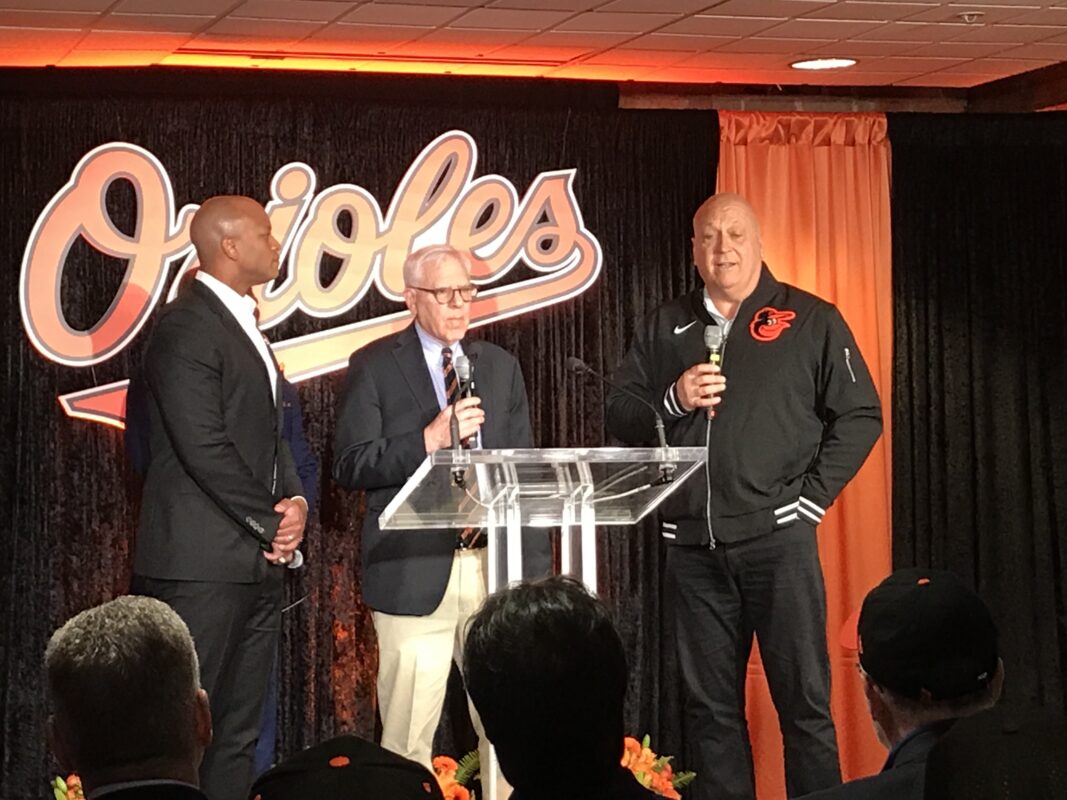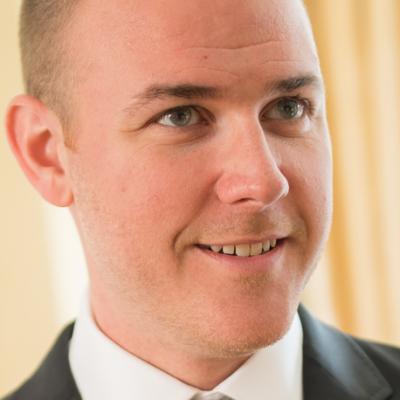
If we ranked Opening Days at Camden Yards for symbolism—apart from the first, when the stadium opened in 1992—this one might top the list.
In the morning, before Thursday’s game even started, the Orioles’ new majority owner, Baltimore-born billionaire David Rubenstein, stood at a dais on the sixth floor of the B&O Warehouse in a blue blazer, tie, khakis, and glasses and declared, “This is a new day, a new chapter.”
A few hours later, Harlem Park Elementary fourth-grader Aubree Singletary, the daughter of a local postal worker—the same job Rubenstein’s father had when he grew up in Pikesville six decades ago—threw out the ceremonial first pitch before the O’s opened their 2024 season with an emphatic 11-3 win against the visiting Los Angeles Angels. Cal Ripken Jr., part of the new ownership group, caught the ball.
On the same stage at the morning press conference, Gov. Wes Moore addressed the tragic collapse of the Francis Scott Key Bridge just a few days ago. He remembered the victims, four of whom have still yet to be found, and urged “everybody to do their part…to rebuild this bridge and rebuild this city.” He passionately described how the Orioles—“the soul of the city”—could play a role. Mayor Brandon Scott, sporting an O’s jacket, nodded in agreement from the front row of the audience.
We are thankful for the members of @TheMDTA who saved lives earlier this week by swiftly shutting down the Francis Scott Key Bridge 🧡 pic.twitter.com/bYP3JlhY7q
— Baltimore Orioles (@Orioles) March 28, 2024
Later, an announced crowd of 45,029 went quiet for a moment of silence to reflect on the shocking accident on the Patapsco early Tuesday morning. A red, white, and blue flag, a replica of the one above Fort McHenry that inspired Key to author the Star-Spangled Banner during the War of 1812, hung in center field.
This was a different, bigger-than-sports day—one where the realities of life mix with what many hope is an escape from it at the ballpark.
“This work is not going to take hours, this work is not going to take days or weeks,” Moore said in the Warehouse about ongoing rescue efforts at the Key Bridge collapse site, then eventual clean-up of the Port of Baltimore channel, and hopefully a new bridge. “We have a very long road ahead of us.”
It’s not an exaggeration to say that, in a baseball sense, this particular group of O’s are familiar with the concept. The word rebuild was associated, now probably too flippantly, with the yearslong project of a new front office, led by general manager Mike Elias after his hiring in November 2018. The plan was to draft well (Adley Rutschman and Gunnar Henderson, for starters) and develop players through the minor leagues. (Now, with Rubenstein’s deep pockets, hopefully we can keep them for the long term.)
Having done that, the O’s went from losing more than 100 games in three straight complete seasons (not including the shortened, fanless COVID year of 2020) to winning 101 last season and an A.L. East championship, before getting swept out of the playoffs by the eventual World Series champion Texas Rangers.
Rubenstein, 74, who made his billions in private equity investing—specifically leveraged buyouts—after going to law school and co-founding The Carlyle Group, formally took control of the team on Wednesday, after MLB owners voted their unanimous approval. It was just two months after he and the Angelos family reached an agreement that would give Rubenstein and partners a majority stake and valued the team at $1.7 billion—and it was just five days after Peter Angelos, another hometown guy who bought the team at auction in 1993, passed away at age 94 following years of declining health. John, one of his two sons, had taken over as the MLB-required “control person” in recent years.
The drama of last year’s Camden Yards lease extension negotiations—as well as the public posturing of John Angelos, and ugly family squabbling and lawsuits before that—is seemingly behind everyone. Rubenstein made sure to say early in his remarks Thursday that he plans to reach a long-term, 30-year lease and development agreement with the state and Moore, whom he’s known for years.
“We’ve had some challenges in the past,” Rubenstein said, “but we’re looking forward…I look forward to working with everybody in Baltimore who would like to help the Orioles become as great as they once were, and as great as we know they can be.”
There will be plans to “rehabilitate” the stadium, Rubenstein said Thursday. Maybe after that, another All-Star Game for Camden Yards. There will be one season, probably two, before any of that comes to fruition, though. In the meantime, Rubenstein says he wants to let Elias continue to do what he’s done since taking over as GM: put together a successful, winning team, and not get in the way. Of course, he also wants a World Series, which is a welcome sentiment from a team whose core of twentysomething emerging stars wants the same. (Perhaps it serves as the answer to the question: What do you get a billionaire who owns an original 1297 copy of the Magna Carta? A professional sports championship for the team he loved as a kid.)
“We want leadership to want the World Series as much as we do,” Henderson, who chatted with Rubenstein earlier this week during a visit to the stadium, said before Thursday’s game when we asked about the ownership change. “I feel like he’s got that same mind frame…He seems like a great guy. I look forward to having him out here.”
Birdland, David. David, Birdland. pic.twitter.com/4tun8bjbdz — Baltimore Orioles (@Orioles) March 28, 2024
Another member of the new ownership group, Ares Management co-founder Michael Arougheti, described Rubenstein’s approach in business as that of a “servant leader. He puts the people that are around him before himself.”
Those in the press conference room got a glimpse of what that style looks like in practice. During a brief Q&A, Rubenstein asked Elias, sitting quietly in the third row of chairs, if he would make a few impromptu comments. Shocked, the GM walked into the spotlight. “Thanks for the heads up,” Elias said to laughter.
“Our most valuable person,” Rubenstein said, “our general manager.”
“He’s testing my spontaneity. Yeah, what more is there to say?” Elias said, but he managed, offering appreciation to Moore, and for the warmth he’s felt from his new bosses: “It’s a very bright day, a very bright inflection point for our franchise. We all feel wonderful about where the Orioles are right now and where they’re going…Hopefully, we can be 1-0 in a few hours.”
About that. The O’s new projected ace of the pitching staff, Corbin Burnes—Elias’ centerpiece acquisition of the offseason—tossed a one-hitter with 11 strikeouts and no walks in six innings (and tied Mike Mussina for the second-most Ks ever in an O’s opener.) It was a sparkling Baltimore debut for the former Cy Young Award winner. “It was fun,” Burnes said afterwards. (Um, yeah.)
Meanwhile, the O’s chased Angels starter Patrick Sandoval in the second inning after building a 5-1 lead, powered by a two-RBI single from catcher Adley Rutschman. Later, rightfielder Anthony Santander blasted an estimated 431-foot, two-run homer to left field in the bottom of the fourth to make it 7-1. In the bottom of the seventh, Cedric Mullins drilled a three-run homer over the centerfield fence, right about where he typically makes home-run stealing grabs himself. Rutschman ended up scoring three times. “Orioles Magic” played after.
The O’s are 1-0, and it was a more-than-promising start of a baseball season. But new eras and new chapters, long roads and rebuilds, last longer than one game, or one day. In this case, that might be for the better.
“I don’t want this to be the high-water mark,” Rubenstein said. “I want the high-water mark to be in the fall when we go to the World Series and show that we are a city that supports a great team. And we are a city that is represented by a great team. We unify the city in ways that only the Orioles can really do.”
